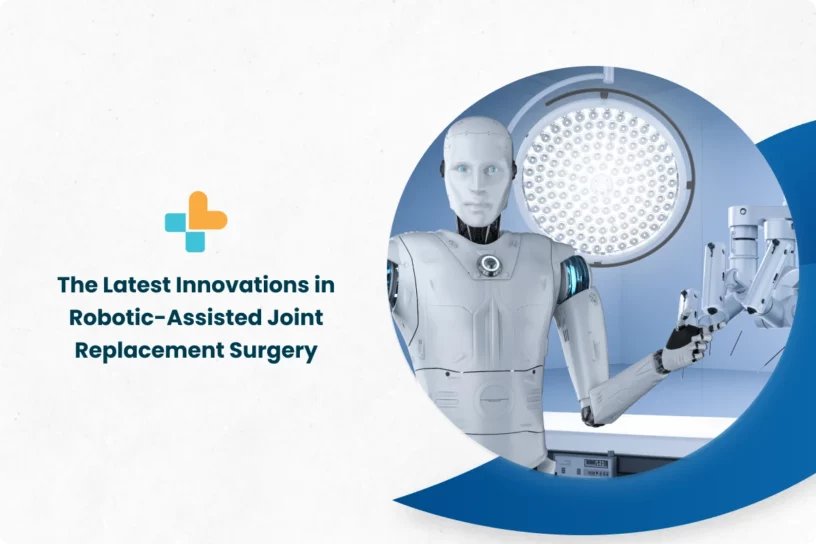Robotic-assisted joint replacement surgery is an advanced surgical technique that combines the precision and accuracy of robots with the skill and expertise of human surgeons. Over the past few years, there have been numerous innovations in this field, including improvements in technology, software, and surgical techniques.
In this blog post, we will explore the latest innovations in robotic-assisted joint replacement surgery and how they are improving patient outcomes and changing the future of orthopedic surgery.
The ideal candidate for robotic knee replacement
The ideal candidate for robotic knee replacement is someone who has been diagnosed with severe knee osteoarthritis, a degenerative joint disease that causes pain, swelling, and stiffness in the knee joint. This condition can significantly impact a person’s quality of life, limiting their ability to perform daily activities and decreasing their overall mobility.
Robotic knee replacement surgery is typically recommended for patients who have not found relief from other conservative treatments such as physical therapy, medications, and corticosteroid injections. Additionally, candidates for robotic knee replacement should have good overall health and be willing to commit to a comprehensive rehabilitation program after surgery.
Other factors that may make a person a good candidate for robotic knee replacement include a BMI below 40, good bone quality, and a knee deformity that can be corrected with surgery. However, the final decision on whether a patient is a good candidate for robotic knee replacement should be made after a thorough evaluation by a qualified orthopedic surgeon.
The surgery is not performed only by a robot
Robotic knee replacement surgery is not performed only by a robot. While robots play an important role in the surgical process, they are used in conjunction with a highly skilled orthopedic surgeon who oversees the entire procedure.
During robotic knee replacement surgery, the surgeon uses a computerized 3D model of the patient’s knee joint to plan the surgery and guide the robot’s movements. The robot then assists the surgeon in making highly precise incisions and positioning the implant components for optimal fit and alignment.
However, the surgeon is still responsible for ensuring the safety and accuracy of the procedure, as well as making any necessary adjustments based on real-time feedback from the robot and their own observations. Additionally, the surgeon is responsible for closing the incision and overseeing the patient’s recovery and rehabilitation program.
This technique can potentially reduce recovery time
Yes, robotic knee replacement surgery has the potential to reduce recovery time compared to traditional knee replacement surgery.
Robotic knee replacement surgery offers several advantages over traditional surgery, including the ability to create a highly precise surgical plan tailored to the patient’s specific anatomy. This precision can result in less trauma to the surrounding tissues, leading to less pain, swelling, and bleeding after surgery. Additionally, the robotic arm can make highly accurate cuts and position the implant components with greater accuracy than a human hand alone.
These factors can result in a faster recovery time for many patients, allowing them to return to their normal activities sooner than with traditional surgery. However, it’s important to note that recovery time can still vary depending on a number of individual factors, such as age, overall health, and the extent of the surgery. It’s essential for patients to follow their surgeon’s post-operative instructions and participate in a comprehensive rehabilitation program to optimize their recovery and regain their mobility.
Also Read : What You Need to Know About Knee Replacement Surgery
This procedure results in a more natural feeling after surgery
Robotic knee replacement surgery can result in a more natural feeling knee joint compared to traditional surgery due to the precise surgical planning and accuracy of the robotic arm. However, individual patient outcomes may vary and it’s important to discuss goals and expectations with a surgeon beforehand.
Every surgery involves risks
Yes, robotic knee replacement surgery has been shown to result in a more natural feeling after surgery compared to traditional knee replacement surgery.
One of the benefits of robotic surgery is the ability to create a highly precise surgical plan tailored to the patient’s specific anatomy. This precision can result in a more accurate placement of the implant components, which can improve the overall function and stability of the knee joint. Additionally, the robotic arm can make highly accurate cuts and position the implant components with greater accuracy than a human hand alone.
These factors can result in a knee joint that feels more natural and better replicates the normal range of motion of a healthy knee joint. Patients who have undergone robotic knee replacement surgery have reported feeling more satisfied with their surgical outcome, experiencing less pain and stiffness, and achieving a greater range of motion in their knee joint.
However, it’s important to note that every patient’s experience is unique, and the results of robotic knee replacement surgery may vary depending on individual factors such as age, overall health, and the extent of the surgery. It’s essential for patients to discuss their individual goals and expectations with their surgeon before undergoing any surgical procedure.
Also Read : What You Need to Know About Minimally Invasive Surgery: Benefits and Risks
Conclusion
In conclusion, robotic knee replacement surgery is a promising advancement in joint replacement surgery that can potentially offer patients a more precise and natural feeling knee joint, leading to improved function and greater patient satisfaction. However, like any surgical procedure, it is important for patients to understand the potential risks and benefits and work with their healthcare provider to determine the best course of action based on their individual needs and medical history.
Ayu Health Network of Hospitals is dedicated to providing quality healthcare services to patients, with a focus on personalized care and patient education. Their team of experienced surgeons and healthcare professionals is committed to staying up-to-date on the latest advancements in medical technology, including robotic knee replacement surgery, to ensure that patients receive the best possible care.
Our Hospital Locations
Orthopaedics Surgery Hospitals in Chandigarh | Orthopaedics Surgery Hospitals in Bangalore | Orthopaedics Surgery Hospitals in Jaipur | Orthopaedics Surgery Hospitals in NCR | Orthopaedics Surgery Hospitals in Hyderabad
Our Doctors
Orthopaedics Surgery Doctors in Chandigarh | Orthopaedics Surgery Doctors in Bangalore | Orthopaedics Surgery Doctors in Jaipur | Orthopaedics Surgery Doctors in NCR | Orthopaedics Surgery Doctors in Hyderabad
About the Author

Dr. Manjunath Kumar K.
Dr. Manjunath Kumar K. is a renowned Orthopaedics currently practicing at Ayu Health, Bangalore.
He is an orthopedic surgeon currently practicing at Mallige Medical Center, Bangalore. A highly qualified doctor, he has completed his MBBS from Bangalore Medical College and MS in Orthopedics from KIMS, Hubli. further higher surgical training was from England, Birmingham. His post-graduate degree from the royal college of Edinburgh and the Royal College of Ireland. He also has vast experience in treating Unilateral Total Knee Replacement, Bilateral Total, Knee Replacement, Total Hip Replacement Surgery, and ACL Tear




